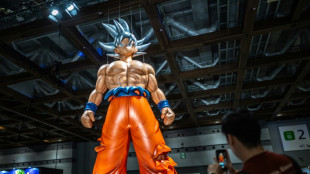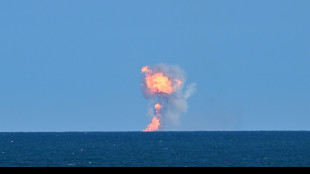
-
 Magritte painting nets auction record of $121 million
Magritte painting nets auction record of $121 million
-
Markets fluctuate as traders weigh geopolitical tensions

-
 N. Korea's latest weapon? Bombarding South with noise
N. Korea's latest weapon? Bombarding South with noise
-
'Kidnapped' Uganda opposition figure Besigye to appear at military court: lawyer

-
 Asian markets fluctuate as traders weigh geopolitical tensions
Asian markets fluctuate as traders weigh geopolitical tensions
-
'An inauspicious day': the landmines ruining Myanmar lives

-
 UN to vote again on Gaza ceasefire, US plans unclear
UN to vote again on Gaza ceasefire, US plans unclear
-
Japan's manga powerhouse 'Dragon Ball' turns 40

-
 Japanese, Koreans bottom of global love life survey
Japanese, Koreans bottom of global love life survey
-
Son blames 'mistakes' after South Korea held by Palestine in qualifier

-
 Japan ramps up tech ambitions with $65 bn for AI, chips
Japan ramps up tech ambitions with $65 bn for AI, chips
-
Lights, action, melodrama! Silent films get new reel at London haven

-
 Myanmar led world in landmine victims in 2023: monitor
Myanmar led world in landmine victims in 2023: monitor
-
ICC to sentence Timbuktu war criminal

-
 Ugandan opposition figure Besigye 'kidnapped', says wife
Ugandan opposition figure Besigye 'kidnapped', says wife
-
Australia's Jason Day eyes more major glory after resurgence

-
 Machu Picchu security boosted after visitors spread human ashes
Machu Picchu security boosted after visitors spread human ashes
-
Popovic hails Australia character in 'crazy' World Cup qualifier

-
 Taliban govt clearing 'un-Islamic' books from Afghanistan shelves
Taliban govt clearing 'un-Islamic' books from Afghanistan shelves
-
Argentina beat Peru as Uruguay hold Brazil

-
 Asian markets struggle as traders weigh geopolitical tensions
Asian markets struggle as traders weigh geopolitical tensions
-
Tatum stars as Celtics end Cavaliers unbeaten start

-
 Hurting India under pressure in blockbuster five-Test Australia series
Hurting India under pressure in blockbuster five-Test Australia series
-
'They killed her dream': Israel strike leaves woman footballer in coma

-
 Iraq holds its first census in nearly 40 years
Iraq holds its first census in nearly 40 years
-
Iraqis face tough homecoming a decade after IS rampage

-
 Russian net tightens around last civilians left in eastern Ukraine
Russian net tightens around last civilians left in eastern Ukraine
-
Olympic champion Tebogo aims to inspire next generation of African athletes

-
 Valencia on target as ten-man Ecuador upset Colombia
Valencia on target as ten-man Ecuador upset Colombia
-
'Rust' to premiere three years after on-set shooting

-
 Strike at French cognac maker Hennessy over measures in China spat
Strike at French cognac maker Hennessy over measures in China spat
-
Xi, Lula meet in Brasilia to 'enhance ties'

-
 SpaceX fails to repeat Starship booster catch, as Trump watches on
SpaceX fails to repeat Starship booster catch, as Trump watches on
-
'I have left a legacy': Nadal retires from tennis

-
 US recognizes Venezuela opposition's Gonzalez Urrutia as 'president-elect'
US recognizes Venezuela opposition's Gonzalez Urrutia as 'president-elect'
-
European powers, US seek to censure Iran at UN nuclear watchdog board

-
 UNAIDS chief says husband, Ugandan opposition figure Besigye, 'kidnapped'
UNAIDS chief says husband, Ugandan opposition figure Besigye, 'kidnapped'
-
Nadal's sensational career ends as Netherlands defeat Spain in Davis Cup

-
 US announces talks with Israel over civilian casualties in Gaza
US announces talks with Israel over civilian casualties in Gaza
-
SpaceX fails to repeat Starship booster catch, as Trump looks on

-
 G20 summit ends with Ukraine blame game
G20 summit ends with Ukraine blame game
-
Trump appoints TV celebrity 'Dr. Oz' to key US health post

-
 European stocks fall on Ukraine-Russia fears, US focused on earnings
European stocks fall on Ukraine-Russia fears, US focused on earnings
-
Last-gasp Szoboszlai penalty rescues Hungary draw with Germany

-
 Germany, Netherlands draw as Nations League group stage ends
Germany, Netherlands draw as Nations League group stage ends
-
Hong Kong tycoon Jimmy Lai takes witness stand in collusion trial

-
 Guardiola set to extend stay as Man City boss - reports
Guardiola set to extend stay as Man City boss - reports
-
Minnows Botswana hold Egypt to qualify with Mozambique, Tanzania

-
 Inter Miami coach Martino leaving club for 'personal reasons' - club source
Inter Miami coach Martino leaving club for 'personal reasons' - club source
-
Chinese man sentenced to 20 months for Falun Gong harassment in US


'Silent pain' of Algerians banished by France to the Pacific
On the 60th anniversary of Algeria's independence from France, descendants of the North Africans deported to the Pacific territory of New Caledonia remember the "silent pain" of their ancestors.
Between 1864 and 1897, as French colonial troops advanced through Algeria, 2,100 people were tried by special or military courts and deported.
They were sent in chains around 18,500 kilometres (11,500 miles) to the other side of the world, to a penal colony on the Pacific archipelago of New Caledonia.
The palm-fringed islands east of Australia are one of France's biggest overseas territories.
"The number of dead, whose bodies were thrown overboard, during the crossing, remains unknown," said Taieb Aifa, whose father was on the last convoy of convicts bought to the colony in 1898.
Those who survived the tough journey became known as the "straw hats" -- a nod to the convicts' headgear as they worked in the blazing sun.
Today, their descendants say that so great is the pain, the story has to be "almost prized from them," Aifa told AFP.
Aifa described a five-month journey to the islands, during which convicts were "chained in the holds" of ships.
For many years, even speaking about his ancestors' tale was taboo.
"A code of silence reigned in the families of deportees," said 89-year-old Aifa, now regarded as a pillar of New Caledonia's "Arab community" after serving as mayor of the small town of Bourail for 30 years.
- Colonised 'became coloniser' -
Aifa's father was sentenced to 25 years for fighting against the French army in Setif, in eastern Algeria.
"From the colonised in Algeria, they became colonisers... On land confiscated from the Kanaks", he said, referring to New Caledonia's indigenous inhabitants.
"In New Caledonia, the French state aimed, as in Algeria, to create a settlement," Aifa said.
Christophe Sand, an archaeologist at the IRD Research Centre in Noumea, who is also the descendant of convicts, said that "the deportees were transformed into colonists".
While some French convicts were later able to bring their wives, it was forbidden for the Algerians.
Those sentenced to more than eight years in prison -- the majority -- were not allowed to return to Algeria after their sentence, said Sand.
"This process must have abandoned 3,000 to 5,000 orphans in Algeria", he said.
Maurice Sotirio, the grandson of a convict from Constantine in northeast Algeria, described the heartbreaking trauma of his family's past.
"My grandfather left two children in Algeria whom he never saw again", Sotirio said.
The suffering continued even in freedom.
In New Caledonia, the Algerians were second-class citizens since they often did not speak French, but Arabic or Berber, said Sand.
Their children suffered from the stigma, and only a few families kept hold of their origins.
At the end of the 1960s, the descendants came together to form an association, the "Arabs and friends of the Arabs of New Caledonia".
The islands -- so-called because a British sailor thought they looked like Scotland -- have been French territory since 1853.
Today, they have about 270,000 inhabitants, with the economy's mainstays the production of metals, especially nickel, of which New Caledonia is a major global producer.
Algeria, which Paris regarded as an integral part of France, is this year marking six decades since its 1962 independence following a devastating eight-year war.
- 'Healing process' -
In 2006, Aifa took his first trip to Algeria.
He said the visit was like "bringing back his father who, like other Arabs, had suffered from not being able to return and die in his native country".
Aifa, while proud of his Caledonian heritage, also celebrates his roots in Algeria.
"I am also Algerian, I have a link with Algeria, family, land... I managed to obtain my Algerian papers 20 years ago", he said.
Sand, who also travelled to Algeria with two other descendants, said he felt he was "carrying his ancestor on his shoulders" on the flight.
"When I saw, through the porthole, the port of Algiers, where my great-grandfather and his companions had been thrown into the hold, I felt the urge to scream," he said.
Arriving at his ancestral home in the village of Agraradj in the northern Kabylia region, he bent down to touch the earth.
"I felt that the symbolic weight that I had on my shoulders since the beginning of the journey had disappeared," he said. "I brought his exiled spirit back to the place where he was born".
For Sand, you have to go through "this process of healing, of closing the door" to "build a future" in New Caledonia.
"Healing from the trauma of exile allows the Caledonians that we are today to project ourselves into the future, without remaining prisoners of the past," Sand said.
H.Thompson--AT
